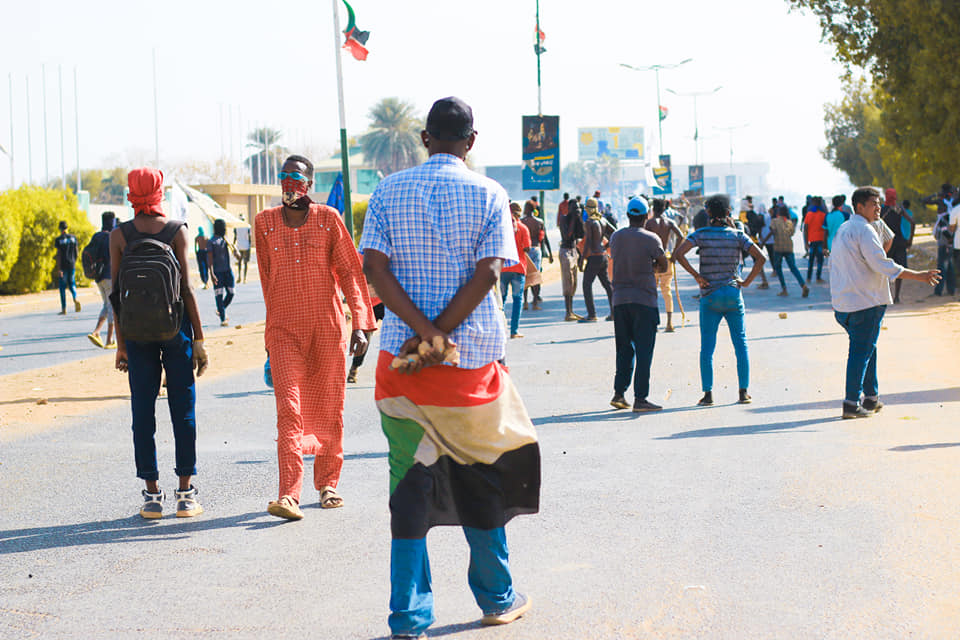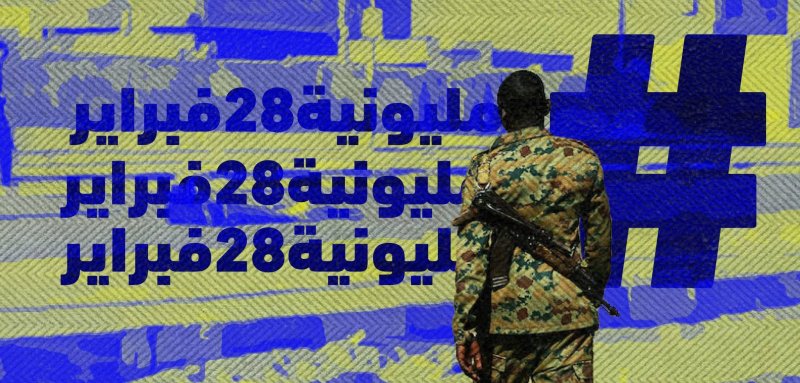Ibrahim Majzoub is just another ordinary young man any person can come across in the streets of Sudan. Just like most other regular folk, nothing unusual or outstanding had ever taken place in his life, but unfortunately the young man met an unusual end after he was shot down in the street at the hands of a policeman, ending his life in a dramatic way, highlighted even further by what the father had said at his son’s grave, when he stressed that the demonstrations against the military in Sudan will carry on!
Earlier this month, demonstrations broke out in the Sudanese capital, Khartoum, and the cities of Omdurman (west), and Bahri (north), at the behest of the Sudanese Resistance Committees, in rejection of the framework agreement signed between the military component in the authority and civil forces. The young Sudanese man, Ibrahim Majzoub, took part in these demonstrations, and subsequently lost his life after he was gunned down by a Sudanese police officer, in what looks like an execution-style killing incident.
The killing of the young man in cold blood at the hands of police caused widespread anger among the Sudanese, and many considered it a systematic act that the police have always practiced, including torture and killings inside detention centres, under a policy of impunity.
The anger multiplied, after activists posted videos showing the exact moment the protester was shot down. Videos show how the young man had rested his hands on the sidewalk and raised his head to look into the eyes of his killer, before his torso hit the ground and his comrades rushed him to the East Nile Hospital, east of the capital Khartoum, where he succumbed to his wounds.
فديو من زاوية أخرى لقاتل الشهيد إبراهيم مجذوب.#مليونية28فبراير #عنان_قوش_البرهان pic.twitter.com/Rd3RWg3e5l
— ترند السودان | SudanTrend (@SudanTrend) February 28, 2023
Planned and deliberate
At first, the Khartoum State Police issued a statement that seemed to justify the killing, claiming that the demonstrators had used excessive violence against the officers working to secure the eastern Nile region, by throwing stones, glass and arrows.
However, after the spread of videos documenting the assassination, the Ministry of Interior quickly released a statement describing it as a personal act and unacceptable behavior that goes contrary to the ministry's directives.
For its part, the protest movement commented on the statements of the police and the Interior Ministry, by saying they are filled with justifications that reflect the true intentions of the police to violate the sanctity of Sudanese lives. This was backed by most social media users, who unanimously agree that the killing of the protester was not an individual act, but rather an organized one.
Will the officer who killed the Sudanese protester Ibrahim Majzoub be punished, or will he get away with it like his many predecessors?
Raseef22 met with Mohammed Issa (a retired police officer), who pointed out that the shooter's colleagues did not remove his weapon from his person or arrest him, which means they’re used to killing.
This is systematic behavior, Issa says, referring to a similar incident that took place on June 30, when a policeman kicked the body of a protester to make sure he was dead after being shot.
At the time, police said they were investigating this crime and routinely issued statements of condemnation to their members who were captured on camera killing demonstrators and pledging to investigate them, but it has never announced the results of the investigations, while also completely ignoring the killings that haven’t been captured in photos and videos.
Mohamed Issa stresses that the killing of the protester is completely unjustified, as the shooting was not motivated by self-defense, the attack wasn’t even large-scale to require the use of force, and the victim was unarmed and did not carry a weapon.
While speaking to Raseef22, he points out that the crime that took place is classified as a deliberate attack on civilians, which is a crime against humanity, not an intentional act of killing. In it, the criminal responsibility is not only limited to the shooter, but also extends to his field commander, the commander who armed him with live ammunition to disperse peaceful protests, and the director general of the police forces.
He adds, "The policeman is only allowed to shoot in self-defense, provided that the target is armed and represents a danger to the policeman that can only be avoided by shooting meant to dissuade him, and not kill him."

Political pressure
The pro-democracy political forces were quick to condemn the killing of the demonstrator, and the Freedom and Change Coalition called for the officer to be tried publicly, and said that this incident reinforces their conviction of the necessity of reforming the regular forces, especially the police forces, and establishing them on a new belief based on respect for the law and the protection of citizens.
Coalition and political forces are engaged in a political process with the military leaders who currently rule the country, seeking to return the military to their barracks and launch a new transitional period under civilian leadership, after agreeing on issues including justice, transitional justice, and security and defense sector reforms.
One of the two factions of the Sudanese Professionals Association (SPA) called the killing of the demonstrator an assassination, and said that it is "a continuation of the violent approach adopted by the regular forces towards peaceful demonstrators since the coup of October 25, 2021, especially the police forces, whose members have been committing these violations and using excessive violence without accountability or legal procedures that do justice to the victims and their families."
This latest incident has reinforced the people's conviction of the urgent need to reform Sudan's regular forces, especially the police forces, and establishing them on a new belief based on respect for the law and the protection of citizens
The number of victims in the context of the protests reached 125, and the Public Prosecution did not say that it investigated security and police personnel except in the case of Ibrahim Majzoub.
More than 7,000 demonstrators were injured from the moment the army took power on October 25, 2021, until August 4, 2022, including more than 400 children, in addition to monitoring 50 cases of sexual violence. Of the total number of injuries, 955 were shot with live bullets and 274 were shot with buckshot, according to Hadreen organization.
In dispersing the protests, security forces and police used anti-aircraft weapons called "DShK", Kalashnikovs, and buckshot, as well as filling of the tear gas launchers "oblen" with stones and broken glass, in addition to water cannons, tear gas, stun grenades and knives.
Escaping punishment
Lawyer and human rights defender Bashir al-Tayeb says that the occasional use of novel, unconventional weapons by the police, such as birdshot, laser guns that cause fractures and breaks in hands, and the filling of "oblen" with stones, confirms that the violations against demonstrators are systematic acts, not the actions of individual soldiers and officers.
While speaking to Raseef22, he points out that police violations are not limited to the use of violence against peaceful demonstrators, but even reach as far as to kill detainees inside detention centers, such as the case of Kamal Mudassir. To this day, the Public Prosecution refuses to convert Kamal’s case from death under mysterious circumstances to intentional killing, despite the availability of evidence that he was killed under torture, including the medical coroner report.
Article 130 of the Sudanese Criminal Code punishes the murderer with the death penalty in accordance with Islamic law
It has been firmly established in the minds of most Sudanese, including pro-democracy forces and the protest movement, that police forces deliberately use violence against peaceful demonstrations and commit violations against citizens, due to impunity and being able to escape any type of punishment, especially in light of the failure to implement judicial rulings issued during the transitional period, to execute those who had killed demonstrators during protests against the former regime to death.
Raseef22 is a not for profit entity. Our focus is on quality journalism. Every contribution to the NasRaseef membership goes directly towards journalism production. We stand independent, not accepting corporate sponsorships, sponsored content or political funding.
Support our mission to keep Raseef22 available to all readers by clicking here!
Interested in writing with us? Check our pitch process here!



